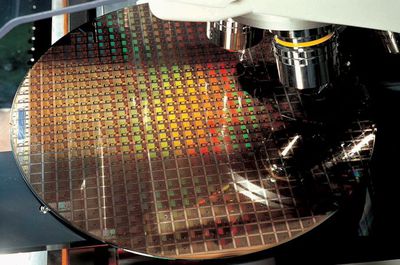Apple Reportedly Agrees to TSMC Chip Price Hike After Refusing Last Week
After refusing a price hike last week from its primary chip supplier, TSMC, Apple has apparently reversed course and accepted the increase in prices set to be applied next year, according to the latest report from Economic Daily News.

From January 1, 2023, TSMC plans to raise the price of 8-inch chip wafers by 6 percent, while 12-inch wafers are set to increase by 3 to 5 percent. Economic Daily News previously reported that Apple wouldn't accept the price increase, but it is now saying the company has agreed to bear the cost.
TSMC's fabrication materials suppliers have been forced to drastically increase prices on the back of the global chip shortage. Other component makers and material suppliers are making similar moves in the semiconductor industry amid a wider price squeeze.
In May, Bloomberg reported that TSMC was in the process of warning its customers of a considerable price increase. This came after a hefty 20 percent price hike in 2021, which was said to be the most substantial chip price rise in a decade. Last year, it was speculated that Apple may have to raise device prices to account for substantial chip price rises.
TSMC produces A-series chips for the iPhone, iPad, and Apple silicon chips for the Mac. The foundry is expected to begin production of 3nm chips for Apple by the end of 2022. Apple's first 3nm chip may be the M2 Pro chip for Macs, while the A17 Bionic chip in next year's iPhone 15 Pro models is also expected to be a 3nm chip.
Apple's transition to 3nm chips will result in further improved performance and power efficiency in upcoming Macs and iPhones, as Apple seeks to preserve its performance-per-watt lead over competitors like Intel, even if that means paying higher prices and potentially passing on the cost to consumers.
Popular Stories
Apple's next-generation iPhone 17 Pro and iPhone 17 Pro Max are less than three months away, and there are plenty of rumors about the devices.
Apple is expected to launch the iPhone 17, iPhone 17 Air, iPhone 17 Pro, and iPhone 17 Pro Max in September this year.
Below, we recap key changes rumored for the iPhone 17 Pro models:Aluminum frame: iPhone 17 Pro models are rumored to have an...
The long wait for an Apple Watch Ultra 3 appears to be nearly over, and it is rumored to feature both satellite connectivity and 5G support.
Apple Watch Ultra's existing Night Mode
In his latest Power On newsletter, Bloomberg's Mark Gurman said that the Apple Watch Ultra 3 is on track to launch this year with "significant" new features, including satellite connectivity, which would let you...
The upcoming iPhone 17 Pro and iPhone 17 Pro Max are rumored to have a slightly different MagSafe magnet layout compared to existing iPhone models, and a leaked photo has offered a closer look at the supposed new design.
The leaker Majin Bu today shared a photo of alleged MagSafe magnet arrays for third-party iPhone 17 Pro cases. On existing iPhone models with MagSafe, the magnets form a...
iOS 26 and iPadOS 26 add a smaller yet useful Wi-Fi feature to iPhones and iPads.
As spotted by Creative Strategies analyst Max Weinbach, sign-in details for captive Wi-Fi networks are now synced across iPhones and iPads running iOS 26 and iPadOS 26. For example, while Weinbach was staying at a Hilton hotel, his iPhone prompted him to fill in Wi-Fi details from his iPad that was already...
The iPhone 17 Pro Max will feature the biggest ever battery in an iPhone, according to the Weibo leaker known as "Instant Digital."
In a new post, the leaker listed the battery capacities of the iPhone 11 Pro Max through to the iPhone 16 Pro Max, and added that the iPhone 17 Pro Max will feature a battery capacity of 5,000mAh:
iPhone 11 Pro Max: 3,969mAh
iPhone 12 Pro Max: 3,687mAh...
Apple today seeded the second betas of upcoming iOS 18.6 and iPadOS 18.6 updates to public beta testers, with the betas coming just a day after Apple provided the betas to developers. Apple has also released a second beta of macOS Sequoia 15.6.
Testers who have signed up for beta updates through Apple's beta site can download iOS 18.6 and iPadOS 18.6 from the Settings app on a compatible...
Apple is developing a MacBook with the A18 Pro chip, according to findings in backend code uncovered by MacRumors.
Subscribe to the MacRumors YouTube channel for more videos.
Earlier today, Apple analyst Ming-Chi Kuo reported that Apple is planning to launch a low-cost MacBook powered by an iPhone chip. The machine is expected to feature a 13-inch display, the A18 Pro chip, and color options...
![]()



















